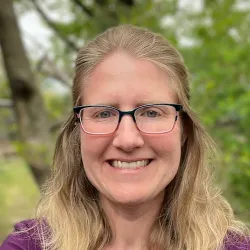Noor Johnson
Research Scientist II
About Noor
Noor Johnson is a research scientist at NSIDC, where she leads several international networks that support community-driven research on environmental change, Indigeous Knowledge documentation and co-production of knowledge, and food security and sovereignty. As PI and lead for the Exchange for Local Observations and Knowledge of the Arctic (ELOKA), she provides data management and user support to Arctic Indigenous communities and researchers spearheading research projects on environmental change, cultural knowledge transmission, and language preservation. Johnson is part of the leadership team (co-PI and social sciences lead) of the Navigating the New Arctic Community Office (NNA-CO), where she develops programming to support ethical data management and co-production of knowledge approaches within the Arctic research community. Johnson has previously conducted research in northern Canada on environmental knowledge production and mobilization and social and environmental justice issues in contemporary environmental governance. Prior to joining NSIDC, Johnson served as a science policy advisor to the Smithsonian Institution, and has served as a science policy consultant to a number of Indigenous and non-profit organizations.
Specialties
Current Research
Exchange for Local Observations and Knowledge of the Arctic (ELOKA): Collaborative Data Stewardship and Knowledge Mobilization for Arctic Community-Driven Research and Observing: The Exchange for Local Observations and Knowledge of the Arctic (ELOKA) partners with Indigenous organizations and researchers to facilitate the collection, preservation, exchange, and use of Indigenous knowledge and community-based observations. ELOKA is currently focusing on data management capacity at the community level, developing digital tools to store and share data and knowledge, and identifying ways to better evaluate the use of data and knowledge to address management and decision-making needs. Applications include. climate adaptation and community planning, environmental and wildlife management, and cultural and place-based education. Working closely with partners, ELOKA is developing and delivering community training on data management, as well as a framework to assess the use of data management tools and a learning and evaluation framework. This is a collaborative project implemented in close collaboration with the International Arctic Research Center of the University of Alaska Fairbanks, Calista Education and Culture, and the Yukon Inter-Tribal Watershed Council, along with other partners. Source of support: NSF Office of Polar Programs
Indigenous Foods Knowledges Network (IFKN): The Indigenous Foods Knowledges Network (ifkn.org) is a research coordination network that brings together Arctic Indigenous communities, Tribal communities in the US Southwest, and researchers. The network advances understanding of the challenges that rapid socio-ecological change poses to food security, food sovereignty, and resilience, and identifies and learns from local solutions to these challenges. Network meetings alternate between the Arctic and the Southwest, are organized in collaboration with a local host organization, and focus on visiting and learning from innovative community projects focusing on Indigenous food security and sovereignty. The network has generated synergies between the Arctic and Southwest, two regions experiencing significant impacts of environmental change, and between Western science and Indigenous scholarship. The network is overseen by an Indigenous steering committee and has supported the leadership and involvement of early career Indigenous scholars. The project is being supported by researchers at NSIDC and the University of Arizona. Source of support: NSF Navigating the New Arctic
Impact of COVID-19 on Food Access in Indigenous Communities in the Arctic and Southwest United States: This project examines the impacts of COVID-19 on Indigenous food access, security, and sovereignty in Alaska and the US Southwest. This project employs a participatory, community-driven methodology involving Indigenous research partners from Alaska and the US Southwest. Thirty-one Indigenous experts from Alaska and the Southwest were interviewed remotely and asked questions about food access and harvesting and agricultural activities over the past year during the COVID-19 pandemic. An Indigenous research advisory committee helped develop research questions, identify experts to interview, and analyze and interpret information from interviews. Improved understanding of the obstacles to food security and the resiliencies in Indigenous foodways will enable both communities and policy makers to plan proactively for future adverse events. Source of support: NSF Office of Polar Programs
